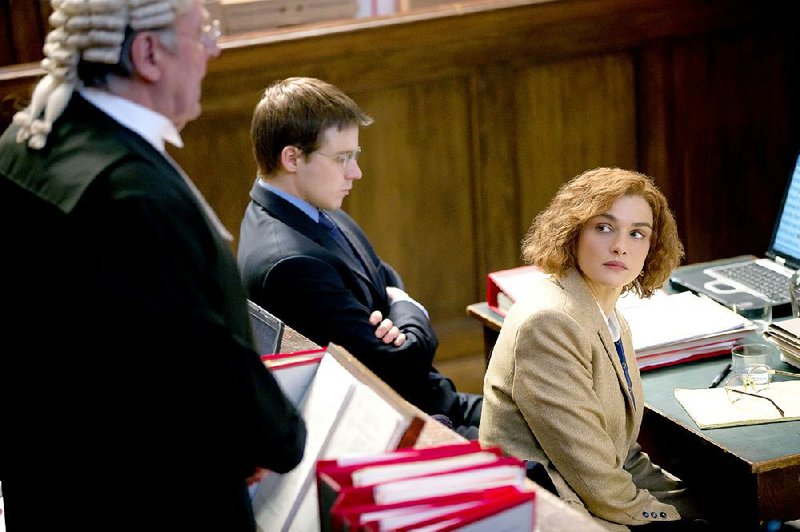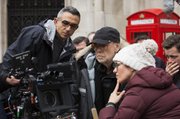"Some of it is obscene, but at times it is almost surreal," Dutch-born historian Robert Jan van Pelt says of Holocaust denial. Van Pelt was an expert witness in a 1999 libel trial of a suit brought in England by David Irving, the author of several books on World War II including the remarkable Hitler's War (1977), a sympathetic biography of Der Fuhrer as a rational politician who had been slandered by historians.
Irving sued Emory University professor Deborah E. Lipstadt for characterizing him as a "Holocaust denier" in her 1993 book Denying the Holocaust. Though Irving's writings clearly downplayed the enormity of the Nazis' "Final Solution," a wrinkle in the British libel law -- which puts the burden of proof on the defendant rather than the plaintiff -- put Lipstadt and her publisher in the awkward position of proving legions died in gas chambers in Auschwitz.
The trial and Lipstadt's recollections of it are the basis for director Mick Jackson's new movie, Denial, which opens today.
On the record
Jackson and van Pelt explained why the director and playwright (Plenty, The Blue Room) and Oscar-nominated screenwriter David Hare (The Hours, The Reader) took few liberties with historical events. The dialogue in the trial sequences are word-for-word from court transcripts.
"We could have made the film more interesting by inventing stuff but we thought, no, this is so special and so important a subject that we won't do that. This is a different kind of film," Jackson says. "Everything that we have (Irving) saying in the movie is taken from speeches, from interviews, from articles, from books he's written and so on. You can't really say we've misrepresented him. We've used his own words. That does tie you to a certain kind of movie. It's not an action movie. It's probably not a date movie."
One challenge for Jackson and Hare was that Lipstadt (Oscar-winner Rachel Weisz), upon the advice of her solicitor Anthony Julius (Andrew Scott), her barrister Richard Rampton (Tom Wilkinson) and the rest of her team, including van Pelt, had to stay out of the press until the trial was over. While the British Weisz had to master Lipstadt's distinctive Queens (as in New York) drawl, she didn't get to use it for a big courtroom soliloquy.
"Throughout the trial, I was told don't care about what appears in the papers or what the public gallery people hear or say. The only thing you should care about is what the judge sees and hears, because nothing else matters, and a judge makes a decision, and he makes it alone," van Pelt says.
Despite being a professor of architecture at the University of Waterloo in Ontario and the co-author (with Deborah Dwork) of Auschwitz: 1270 to Present, most of van Pelt's testimony was not on the stand with Irving and Rampton questioning him but with a 770-page document he had prepared for Lord Justice Charles Gray, who decided the case.
"So in that sense, when I came on the stand ... the only thing I could show was how well I could take a beating," van Pelt recalls.
Contacted for this story, van Pelt expresses support for the film. Still he has some reservations about which events were depicted in the film and which were left out. And, while to my untrained ear, British actor Mark Gatiss sounded remarkably similar to the voice on the other end of the phone, others disagree.
"Yesterday, there was a discussion, and somebody said ... it was my voice and my accent. Other people said it wasn't. My wife believes it's not," he says. And then there's his quibble about how his character was portrayed.
"With people who are involved with topics like this, we negotiate with a lot of bleak humor," he says. "Gatiss does not show that at all. He is a very dour Auschwitz scholar, I think."
Van Pelt says that one crucial scene, played as a dramatic highlight in the film, was actually quite different in real life -- even though the film quotes the court transcript verbatim, it doesn't quote the entire transcript.
"Actually, it was one of the very few times I cracked a joke," van Pelt says. "I felt totally in charge of the situation, and I felt it had no bearing on the core issue that we needed to deal with in the case. The way Mark plays me is like a deer in the headlights.
"The judge wanted to end the proceedings, and Irving didn't want it and says, 'the mouse is now sitting in the trap.' He wants to close the trap, and the mouse is Robert Jan van Pelt, and the judge looks at me, and I say, 'I'm in the trap and have found this big piece of cheese, and I would like to nibble a little bit more on the cheese. As a mouse, I'd be able to get the cheese without the trap closing.'"
Real Meets Reel
If van Pelt wishes his wit had made the final cut, he's quick to state that Wilkinson nailed Rampton's delivery, and Jackson credits van Pelt's own account of the trial, The Case for Auschwitz, for giving Denial a pivotal scene.
"I owe to him when he mentioned in the book how angry Rampton was and how he'd said to professor van Pelt, 'If I'd stayed there any longer, I would have been so angry I wouldn't have been able to carry on with the case,'" Jackson says. "I felt great sympathy for both of them. That really happened. There was that argument at Auschwitz."
For both men, Auschwitz is more than a word in a textbook. Jackson is probably best known for directing the Kevin Costner-Whitney Houston blockbuster The Bodyguard and he won an Emmy for his bio-pic Temple Grandin. Nonetheless, his experiences work on the 1973 documentary The Ascent of Man with British mathematician and historian Jacob Bronowski led him to pursue his current film decades later.
"I went [to Auschwitz] with Bronowski," Jackson says, "and we went to that pond at the back of Crematorium 2 where, among other places, they just dumped this avalanche of ashes coming out of the crematorium in the river, on the marshland, into this pond. He walked into this pond on camera and picked up some of the sediment from the bottom and made this kind of iconic plea for tolerance. We rehearsed it to see if it was physically possible, and I walked into that pond. I reached down, and I found myself to my surprise, because I was just doing my job, that I was holding human ashes."
Living the Evidence
In addition to facing off against Irving in Denial, van Pelt appears in Errol Morris' (The Fog of War) documentary, Mr. Death: The Rise and Fall of Fred A. Leuchter, Jr., where he explains why The Leuchter Report, which Irving published and used as the linchpin for his arguments against the Holocaust, was essentially a work of toxic nonsense (Leuchter ignored a sizable archive that proves that killings occurred where he says they didn't). Irving appears in that film, too.
Working on the Morris film ended up helping his research that's depicted in the current film.
"I never really wanted to go into that swamp. It was really Errol who invited me to engage with it," van Pelt says.
"It was only then when I was on my way to Auschwitz in March 1998. Three days before I left -- I already had a ticket -- I get a letter from Lipstadt ... So in some ways, I was very well prepared for that meeting because I was going to film in Auschwitz, and I knew everything about Leutcher. In some way the Errol Morris adventure was very fortuitous for me."
Van Pelt's most recent project is The Evidence Room, an exhibit at la Biennale Di Venezia in Venice, where he and his team have re-created the implements of death from Auschwitz, giving visitors a horrifyingly concrete sense of what happened during World War II. For those who can't make it to Venice, there's a website (theevidenceroom.com) and a companion volume written by van Pelt and Donald McKay.
"The ability to touch any reality and to engage with it emotionally is disappearing very fast," he says. "Because Holocaust denial is rooted in the world of the internet, it's all about these flashes of information and misinformation that pass by, and it's not even about imagining what is the reality about a gas chamber, what is it like to be pressed against a gas column in that room because you are there with 2,000 other people.
"For us, it's about the idea being able to hold and feel the cold steel and to touch the wood of a gas door and to hold in your hand the protective covering of the peep hole. When we had the Canadian ambassador come on the opening day, the sound of metal-on-metal was so penetrating that the ambassador burst out into tears."
MovieStyle on 10/21/2016


